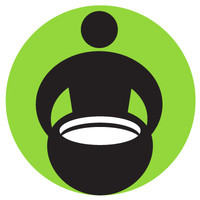When I first heard about the washing machines, I thought, “Really?” I’m so used to hearing Fair Trade farmers tell me about how they invested their community development premiums in things like healthcare programs, scholarships for kids and environmental programs.That's why I was truly surprised when a group of flower farm workers in Cotopaxi, Ecuador, presented me with a piece of magic machinery that gives people their Sundays back.
During my visit to the farm, I asked a worker, Elsa Vasquez, why her community decided to spend their premium funds on something as simple as a washing machine. Her statement was very clear:
“I used to spend my Sundays, every single one, from 8am to 1pm down in the river washing my family’s clothes by hand. Now I spend it with my family. We go to church together. I take my children to see their grandparents. We have lunch together. I got my Sundays back!”
This made me think about the assumptions we often make about people and their needs, especially those we mean to “benefit” with development assistance, and even through Fair Trade. In this case, it was profoundly clear that nobody knew better about what the workers on this farm needed than the farm workers themselves. They simply wanted their Sundays back.
Those workers, most of them women, not only bought washing machines with the Fair Trade premiums, some of them also bought computers, paid for English classes for their kids, and spoke about their dreams of one day buying a house for their families.
Because of the opportunities and benefits of Fair Trade, it turns out that reality was not so far off. The workers soon met together and decided to dream big. They chose, against the well-intentioned advice from the farm manager, to invest in a plot of land where they’ll soon begin constructing houses for each and every farm worker. The manager told me:
“I guess I am more conservative than the workers. I thought to myself: houses for everyone? That’s impossible. But now that I see how much progress they’ve made and how enthusiastic they are with the project, I’m glad they made the decision.”
Workers are now negotiating a subsidized loan from the Ecuadorian government to begin the building process. The Fair Trade premium will help with many of the expenses to get the land ready, and to begin building the foundation of the place they will raise their families and plant the seeds of a brighter future. I suppose it really was a magic washing machine after all.
The farm workers told me that they will rely on future sales of Fair Trade Certified flowers in order to receive the Fair Trade community development premium and continue building their homes. Farm workers and management now share a common goal: increase Fair Trade sales.
As somebody who knows many people with professional degrees in Ecuador who themselves do not own homes, I am very inspired by the example these workers have set.
Everything we’ve learned from the farm workers in Ecuador is helping us to create similar impact for farm workers in coffee through our Fair Trade for All initiative. The challenges are similar, but there are significant differences. For example, migrant workers are a lot more common in coffee, and figuring out how Fair Trade could help in a way that makes sense to them will be a difficult but inspiring task.
It may be a challenging road ahead, but I believe now more than ever that if Fair Trade can help Ecuadorian flower farmers get their Sundays back, it can do so, so much more.
__________________________________________________________________________
Miguel Zamora is the Director of Coffee Innovation & Producer Relations at Fair Trade USA, where he is focused on creating opportunities between buyers and coffee-growing communities around the world (pictured on the right).
Miguel began working at Fair Trade USA in early 2006 after spending several years working with small-scale farmers in agricultural production, commercialization, development, sales and research in Latin America. In Ecuador, his country of origin, Miguel worked in banana and fruit production and in sales of agricultural inputs. In Honduras, he worked with small-scale dry bean farmers in development projects after Hurricane Mitch. Miguel is currently focused on bringing the benefits of Fair Trade to farm workers and independent small-scale farmers in coffee.

Fair Trade USA is a nonprofit organization that is the leading third-party certifier of Fair Trade products in the United States. Fair Trade USA audits and certifies transactions between U.S. companies and their international suppliers to guarantee that the farmers and workers producing Fair Trade Certified goods were paid fair prices and wages, work in safe conditions, protect the environment, and receive community development funds to empower and uplift their communities.














